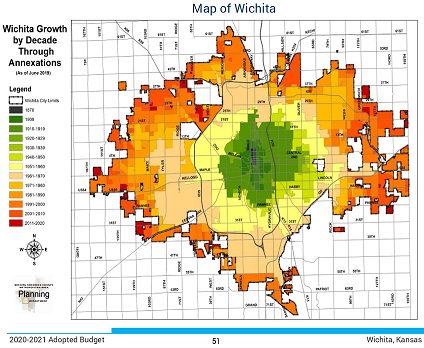 WICHITA ~
WICHITA ~
MORE INFO
NOTE: Except as noted, these comments are the opinions, perspectives or recollections of the author.
No guarantee of accuracy is made;
However,
a reasonable effort has been made to realistically reflect the author's understandings from a life-long familiarity and involvement with the community.
INFRASTRUCTURE
- Water
Wichita's water system, like water systems throughout most cities of comparable size and age, is a city-run utility (operated, here, by the City of Wichita Department of Public Works), and -- again, like most cities -- is suffering from decades of neglect (some of the city's infrastructure is a legacy of the 1930s Roosevelt Administration's federal public works projects.) Wichita's water system also serves most of the surrounding suburban communities, at a cost.
In 2019, the city was rocked by reports that the city's main water-treatment plant is in danger of failure, potentially forcing the entire city onto bottled water. A frantic, and controversial, government move to get the water plant replaced -- awarding the largest city government contract in Wichita history to a friend of the Mayor -- resulted in scandal and the mayor's defeat in the November, 2019 election. However, the City Council (and still-incumbent Mayor) appear poised to push the contract through before his successor can take office (in January, 2020).
Water Sources:
Wichita draws its water chiefly from three sources:
- Cheney Reservoir, 30 miles northwest of the city, fed by the Ninnescah River. (The lake is frequently polluted with agricultural-runoff chemicals that spawn noxious algae blooms, occassionally adding an algae aroma to the city's water). Variability in river flows -- owing particularly to increasingly severe and prolonged droughts, as the climate changes -- undermine the reliability of this supply.
- The Eqqus Beds, an underground aquifer. Traditionally aquifers are fed by rain, above-ground rivers, and snowmelt from mountain ranges. Over-consumption of the water in the Eqqus Beds, along with reduced rainfall and frequent, prolonged droughts, began to deplete and endanger them. To counter the depletion, a few decades ago, the city began pumping water into the Eqqus Beds from...
- The Arkansas River -- through water pumped into the Eqqus Beds, to replenish them. Variability in river flows -- owing particularly to increasingly severe and prolonged droughts, as the climate changes -- undermine the reliability of this supply. It is further undermined by the loss of a decades-long lawsuit by the State of Kansas against Colorado (source of the Arkansas River) for withholding water unfairly. The courts eventually ruled against Kansas, allowing only a very slight award to the state, essentially granting Colorado the right to continue withholding water from the river, as Colorado's population and agriculture near to, and around, the Arkansas River basin, grows.
Early in 2019, word leaked out that the city's water system was in grave trouble, with the city's main water-purification plant on the verge of collapse. This triggered a series of city-shaking news and events that largely shaped the outcome of the Wichita's 2019 mayoral election.
These matters are well-documented in the following articles, chiefly from the city's newspaper, the Wichita Eagle & Beacon., who exposed a scandal involving the granting of city's largest-ever contract -- a contract to replace the water plant.
- Electricity
Wichita's electricity is provided by a state-wide utility company, Evergy -- the product of a 2019 merger of Westar Energy (formerly Kansss Gas & Electric Co. -- "KG&E" -- which served Wichita and southern Kansas) with Kansas-City-area "KP&L -- Kansas Power & Light." Despite consumer advocates' objection to the merger, the merger was approved by the state's utility-regulatory body, the Kansas Corporation Commission (KCC).
The KCC -- normally headed by a panel of three Commissioners appointed by the Governor -- has, for several years (starting during Gov. Brownback's admnistration) be made up of former executives of the companies KCC regulates. Not surprisingly, the KCC has generally granted every rate request, and just about every other request, made by the utility companies it regulates. As a consequence, Wichita's electric rates have grown steadily in recent years.
Residential rates are different from commercial and industrial rates.
Consumers who wish to use their own solar power eqiupement, instead of -- or as a supplement to -- Westar's power, may find it difficult to clear the hurdles thrown up by the utility and city inspectors. For years, Westar aggressively fought attempts to get it to accept and pay for electricity generated by consumers whose solar equipment produced more electricity than they needed for their own use.
Westar (now part of Evergy) derives most of its Wichita-area electricity from fossil-fuel-powered plants -- one just southwest of the city, another northwest about halfway between Wichita and Hutchinson. The Wolf Creek nuclear powerplant, near Burlington, in east-central Kansas, is another key power source, though its future is uncertain. Increasingly, Westar has been deriving its power from numerous wind turbines at "wind farms" throughout the state -- most notably in neighboring Butler and Greenwood counties to the east of Wichita. Westar's 2019 merger with Kansas Power & Light -- to form the new utility "Evergy" -- raises questions about its future sources of electricity.
As part of their "franchise agreement" giving them sole authority to act as an electric utility in Wichita, Westar (now Evergy) is required to maintain and power the city's streetlights. It has, however, been extremely negligent in doing so.
(See the
"Streetlights" subsection,
in the
ROADWAYS section
of the
TRANSPORTATION - MORE page
of this website.
- Natural Gas
Wichita is served by multiple natural gas utilities -- in particular, Kansas Gas Service, and, increasingly, the Black Hills Energy gas utility.
Natural gas is the preferred heating fuel in the Wichita area, though many homes are "all-electric", and many homes and businesses are increasingly relying on electric "heat pumps" to efficiently extract heat from outside air, during moderately cold weather.
(Heating oil and coal are not generally used in the Wichita area, nor in Kansas generally. This is at least partly due to the regional proximity of numerous natural gas wells, transmission pipelines, and refining facilities Though many Wichita homes have fireplaces, they are generally used mostly for decorative purposes, and only provide a little of the city's home heating.).
- Other
Wichita History
(For a brief coverage of Wichita's history, in separate windows, see:
-
Planes on the Planes
,
which summarizes Wichita history from pioneer days to the end of World War II.)
-
A Glance at 150 Years of Wichita History
,
which briefly highlights some exceptional and peculiar milestones in Wichita history.)
-
History of Wichita, Kansas
,
(a more-detailed history from
Wikipedia,
the free encyclopedia.)
-
History of Wichita
,
(a short business history of Wichita from
the Wichita Regional Chamber of Commerce.)
-
Wichita Photo Archives
,
(the history of Wichita in photos, a superb array, from the local Historical Museum, Library, and Wichita State University.)
-
Wichita history in photos Side-by-side comparisons.
,
(the history of Wichita in photos, comparing historic photos of old Wichita sites with photos of their present-day situation, by the Wichita Eagle.)

-
MAPS of Wichita History:
-
Wichita History Walk
,
(three guided walking tours of historic downtown/inner-Wichita, for use with a smartphone (CAUTION: Downloading unknown apps into your smartphone is a serious privacy and security risk.)).
Official Websites about Wichita

Major Media in Wichita

CAUTION: Media websites are notorious for questionable online practices, including tracking your identity, reading interests and any comments you post, and for various automated functions and third-party ads, which can compromise the stability, security or efficiency of your web browser and your computer. In particular, this has proven repeatedly to be a chronic problem with the Wichita Eagle & Beacon website, and, to a lesser extent, with KWCH-TV's site.
Other Sources on Wichita

-
Planes on the Plains:
- A quick history of the "Air Capital City"
from its pioneer origins
to its early aviation years.
-
Wichita Photos - Search & Browse
Special Collections photos from the
-
Wings Over Kansas
- premier Kansas aviation news & history site.
-
Wichita Liberty blog
...a highly political, but informative, Libertarian blog,
unusually well-informed on local politics,
with fresh, analytical views, often sharply different
from official & major media sources,
but often reflecting Libertarian sentiments
of key local officials & their constituents, and the Koch brothers.
(NOTE: Listing this outlet does NOT imply ANY endorsement of their political views.)
Participate - Let your voice be heard!
|
|